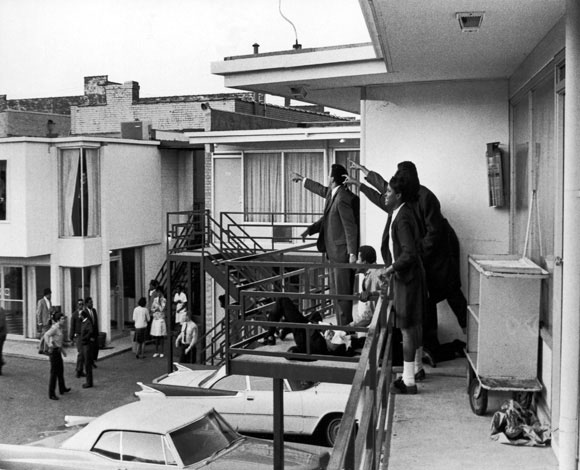On April 4, 1968, on the balcony of the Lorraine Motel in Memphis, an assassin’s bullet stole the life of civil rights leader, Dr. Martin Luther King, Jr.
Before arriving in Memphis, Tennessee, Dr. King was organizing the Poor People’s Campaign. The Campaign sought economic and civil rights while demanding anti-poverty legislation. Thousands of people would eventually camp out on the National Mall in Washington, D.C., in an effort that would later inspire movements like Occupy Wall Street.
During a rainstorm on February 1, 1968, two black sanitation workers in Memphis lost their lives when the truck’s compactor accidentally triggered. On that same day, 22 black sewer workers were sent home without pay while their white coworkers received compensation. On February 12, over a thousand black sanitation workers went on strike wearing placards reading, “I AM A MAN.”
Dr. King spoke at a rally supporting the striking sanitation workers on March 18 promising to lead a march later in the month. According to the Select Committee on Assassinations of the U.S. House of Representatives, a black civil rights group named the Invaders sabotaged the March 28 demonstration by distributing hundreds of two by two sticks attached to placards into the hands of impressionable black children caught breaking store windows. The Invaders allegedly incited violence against Dr. King’s orders of peaceful resistance.
The FBI has revealed its illegal COINTELPRO harassment of Dr. King and the existence of at least 5 paid informants who reported to their Memphis Field Office. In addition to the FBI informants, a black undercover Memphis PD officer named Marrell McCollough had infiltrated the Invaders in 1968. McCollough stood in the parking lot of the Lorraine Motel on the night Dr. King died. He claimed to have been the first person to reach the body.
Because of the violence perpetuated during the March 28 demonstration, the city of Memphis filed a formal complaint against Dr. King and his associates within the Southern Christian Leadership Conference. On the last day of his life, Dr. King spent most of his time with Dr. Ralph Abernathy of the SCLC. While Rev. Andrew “Andy” Young of the SCLC had convinced U.S. District Court Judge Bailey Brown to allow Dr. King to organize a peaceful march scheduled for April 8, Dr. King was preparing for dinner with Rev. Samuel “Billy” Kyles.
On the day of April 4, 1968, Dr. King’s Memphis PD security detail had been withdrawn, a black Memphis PD detective posted near the Lorraine Motel had been removed and 2 black firemen in a station near the Lorraine Motel were transferred shortly before the assassination. Former Memphis PD Detective Jerry Williams had been assigned to Dr. King’s security detail twice before his final visit in 1968. Det. Williams claimed on Dr. King’s final visit no black officers had been assigned to his security detail. The day before Dr. King’s death, Inspector Don H. Smith requested to remove his detail. The request was granted.
Accounts differ regarding Dr. King’s final words. According to FBI documents, Dr. King was discussing the weather with his chauffeur, Solomon Jones, Jr., when the fatal shot struck. Rev. Jesse Jackson instead recalls Dr. King chastising him for not wearing a tie. Dr. King turned to musician Ben Branch, who was standing beside Jackson, and said, “Make sure you play Take My Hand, Precious Lord. Play it real pretty.” Those were his last words.
While recalling Dr. King’s final moments, Rev. Billy Kyles who was standing beside Dr. King on the balcony admitted, “Only as I moved away so he could have a clear shot, the shot rang out.” FBI documents revealed Dr. King’s trusted friend and renowned photographer, Ernest Withers, had been secretly working as an FBI informant.
Although the Invaders had been removed from the Lorraine Motel a few hours earlier, undercover MPD officer Marrell McCollough remained on the premises until Dr. King’s death. McCollough claimed he spent the day shopping with Rev. James Bevel and Rev. James Orange of the SCLC. Standing in the parking lot of the Lorraine Motel, McCollough witnessed Dr. King’s assassination then ran up the stairs to view the body. ABC News confirmed McCollough went on to join the CIA and later testified on March 12, 1978, to the House Select Committee on Assassinations.
In 1999, civil trial King v. Jowers determined former Memphis PD officer Loyd Jowers had been complicit in a conspiracy to assassinate Dr. King. In December 1993, Jowers appeared on ABC’s Prime Time Live confessing to his participation in Dr. King’s assassination. Jowers admitted he believed MPD Lt. Earl Clark fired the shot that killed Dr. King, not James Earl Ray.
“A time comes when silence is betrayal.” – Dr. Martin Luther King, Jr.
https://twitter.com/AndrewEmett
https://www.facebook.com/andrew.emett











Sign up on lukeunfiltered.com or to check out our store on thebestpoliticalshirts.com.